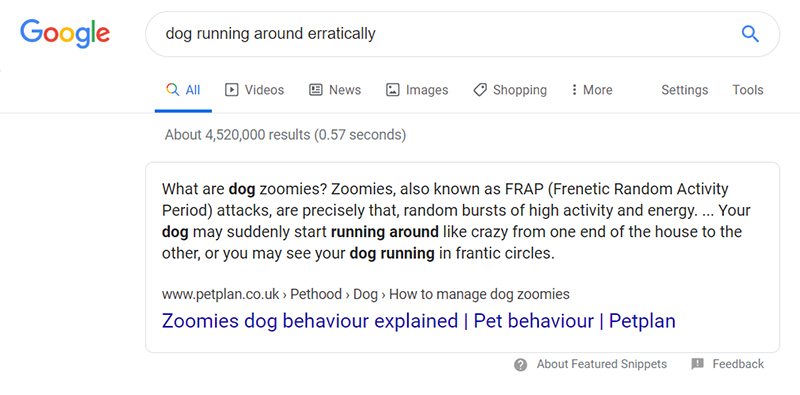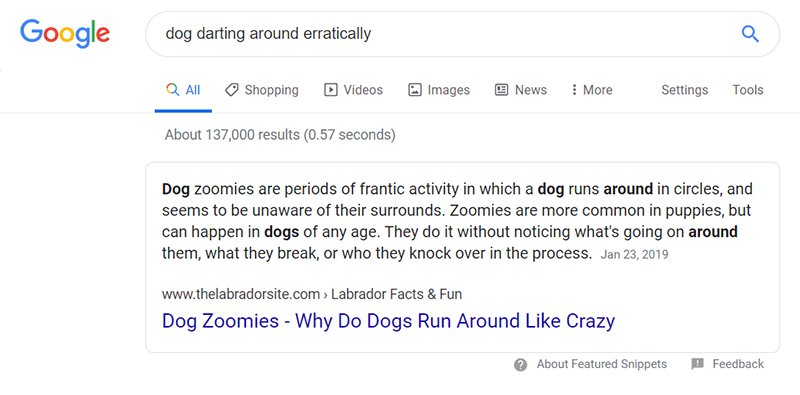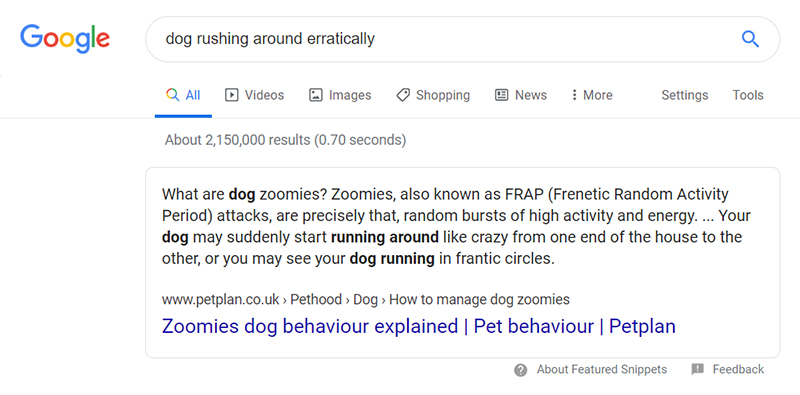If you are working in SEO or just learning, at one time or another you have probably heard about synonyms by:
- Someone telling you that you need to add synonyms to your website for SEO.
- A plugin on your WordPress site recommended synonyms for best SEO results.
- Seeing a mention of this article and you were curious how synonyms could improve your SEO.
- Reading conflicting articles on synonyms and you don’t know which is true.
Whatever brought you to this article, you can make an informed decision in this confusing world of synonyms for SEO.
Why Most SEOs Tell You to Use Synonyms?
Most SEOs will tell you that you should use synonyms in your content because that’s what Google says to do, or that it is a common SEO best practice.
However, not many will tell you (nor will they know) the history of how the use of synonyms came about.
In 2010, Google’s official blog post titled “Helping Computers Understand Language” that:
“The goal of a search engine is to return the best results for your search, and understanding language is crucial to returning the best results. A key part of this is our system for understanding synonyms.”
Fast forward to September 2018 when Google’s search liaison Danny Sullivan tweeted:
“This is a look back at a big change in search but which continues to be important: understanding synonyms. How people search is often different from information that people write solutions about.”
This kick-started the industry even more into a frenzy on optimizing websites with synonyms.
As I mentioned in my recent article on neural matching, SEO professionals will “… tell you to just add synonyms, however, it’s not about just adding synonyms or adjectives to your content.”
Should You Use Synonyms for SEO?
The simple answer to whether you should use synonyms for SEO is a “yes” however, this strategy should be treated carefully.
Only use synonyms when and where it flows with the natural language of the site and/or page.
On September of 2019 Google’s John Mueller mentioned in a Hangout Q&A:
“You could imagine situations where maybe you have a pharmacy pharmaceutical product which has a fancy medical name and has a kind of a general colloquial name as well. Users might be searching for that easier name because that’s something that they hear about from their friends, and if you’re only using the fancy medical name on your pages then you’re going to have trouble ranking for those terms.
Whether or not you have trademark rules or guidelines that say that you should only be using this kind of long medical name if you don’t use the words that people are using to search for your pages, then it’s gonna be trickier to rank for those terms. It’s not impossible, we can understand in the case with the – or not, that’s something easy to understand. Even in the case of a long medical name, versus a colloquial name, that’s something we can try to figure out. That these are similar or synonyms, but if you’re not mentioning what people are actually searching for, then you’re gonna have a hard time. So if you’re writing content for users and you know they’re searching in a particular way then try to take that into account.”
‘LSI Keywords’
LSI, or Latent Semantic Indexing, is a natural-language processing technique developed in the 1980s. “LSI keywords” are words and phrases that are semantically related to a topic.
Many SEOs lump LSI keywords in with synonyms when it comes to optimizing a website.
They assume that if you’re optimizing your website for “cars”, then the use of the word “automobiles” and “vehicles” should be used in conjunction with “transmission”, “engine”, “brakes”, “steering” and other auto-related terms.
While it makes sense that Google should use LSI, John Mueller tweeted:
There's no such thing as LSI keywords — anyone who's telling you otherwise is mistaken, sorry.
— 🍌 John 🍌 (@JohnMu) July 30, 2019
Alternatively, Google uses neural matching which is a machine learning of various signals to determine if a page is relevant to the user’s intent from search.
For example, a user clicks a result and comes back quickly to click another result.
When a large number of users clicking the same link only to come back to try another result tells Google that the result isn’t what is expected.
The second result that users click and don’t come back will then begin to rank higher.
What Are Semantically Related Keywords?
Semantics is a classification of linguistics that focuses on deriving meaning from a series of words.
Semantically related keywords are words or phrases that are in relation to each other conceptually telling a cohesive story.
SEOs believe that having more semantically related keywords means that your webpages provide more contextual background on a topic and therefore they can perform better in search results.
The theory is that by using synonyms and other words related to your topic, Google would be able to make connections between the semantically related terms and be able to best match the user’s intent.
What Synonyms Mean for SEO
The idea that you should formulate how often you use synonyms with your focus keywords is an outdated SEO strategy.
The use of synonyms and semantically related keywords should come naturally in the flow of your website content.
Google uses the signals from users themselves more than they value the words on the page.
For example, a user searches “dog running around erratically” or “dog darting around erratically”. While they mean the same thing, they are treated as different results even though both results are explaining “zoomies”.


When you look at the results for “running” the text is simple with only 3 mentions of running and 13 mentions of “zoomies” with one mention of the exact phrase “dog running around erratically”.
The “darting” result has 6 mentions of “running” and 91 mentions of “zoomies” with no mention of the exact phrase or the word “darting”, and an addition of several questions and answer sections around the topic.
In addition, the “darting” result has 44 links pointing to the page with 80% of those links including topics around “zoomies”, and the URL structure is directly under the main domain.
Alternatively, the “running” result has no backlinks and the URL structure is 4 levels from the main domain yet the “running” result also ranks for “dog rushing around erratically” (though no mention of “rushing”):

With the “darting” result stuffing the page with the keyword “zoomies” and so many backlinks the result might show up for variations of the phrase.
By over-optimizing the page, the site has hurt itself more than it has helped.
The lesson here is to keep your content simple, use synonyms only when they make sense and don’t over-optimize your site and it’s pages.
When to Use Synonyms for SEO
Only use synonyms when it makes sense. If the data shows that users are actually searching terms related to your focus key term, then it makes sense to include them.
Don’t try to stuff your content with synonyms for the sole purpose of ranking. Google will most likely not pick up the focus term with too many synonyms or over-optimized content.
For example, I developed a test site in an attempt to get results for searches around “near me”.
The site domain is “nearyouhub.com”, that mentions “near you”, “close by”, “nearby” and more without a heavy focus on “near me”.
The site was launched 4 months ago and has been increasing in impressions for “near me” terms:

The idea behind the test is that users are searching “near me” but the language on the site doesn’t make sense to say “near me” since the site is speaking TO the user.
When & Why You Should Not Use Synonyms for SEO
In the case where your topic is clear and there are no variations that users might be using to find what they are looking for, then you should stay away from synonyms.
Words like “animal”, “forest”, “sand”, “water”, “salt” and many other words that may have other meanings might not have alternates that mean the same thing.
Your brand is an example of when you should stick to your key term and not try to work in synonyms.
For example, I had worked with Hint Water a few years ago to optimize their website. There were talks about how the blog could mention water in more creative ways.
We focused efforts on health, diet, and flavored waters when talking about the product. There were no alternative keywords to “water” or the brand name “hint”.
Conclusion
Many tools and professionals will talk you into using synonyms, and at times the strategy will make sense.
But don’t use synonyms in an effort to increase your rankings if they don’t make sense.
Instead focus on descriptive words and keep your content simple, easy to understand, and accessible to the user.
More Resources:
- SEO in 2020: What Basics You Need to Know to Be Successful
- What Is Latent Semantic Indexing & Why It Won’t Help Your SEO
- How to Avoid SEO Misinformation
Image Credits
All screenshots taken by author, February 2020





![AI Overviews: We Reverse-Engineered Them So You Don't Have To [+ What You Need To Do Next]](https://www.searchenginejournal.com/wp-content/uploads/2025/04/sidebar1x-455.png)